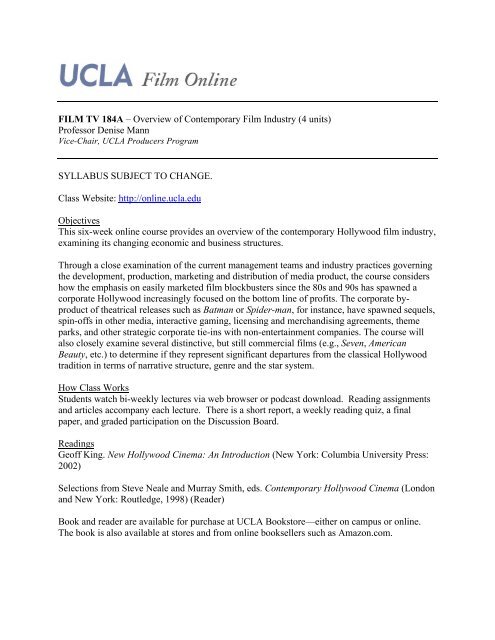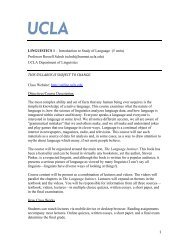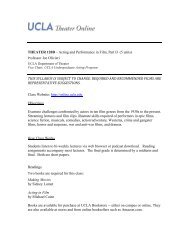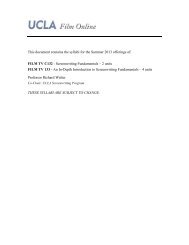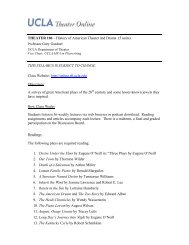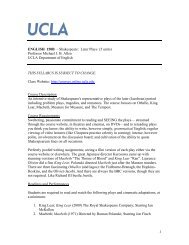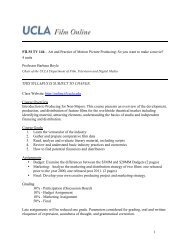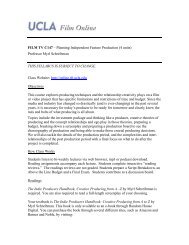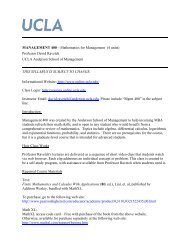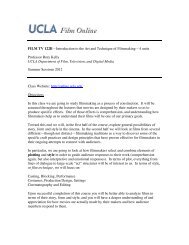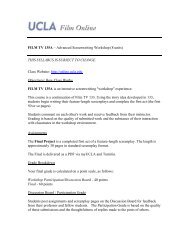Film 184A Syllabus - UCLA Summer Sessions Online Courses
Film 184A Syllabus - UCLA Summer Sessions Online Courses
Film 184A Syllabus - UCLA Summer Sessions Online Courses
Create successful ePaper yourself
Turn your PDF publications into a flip-book with our unique Google optimized e-Paper software.
FILM TV <strong>184A</strong> – Overview of Contemporary <strong>Film</strong> Industry (4 units)<br />
Professor Denise Mann<br />
Vice-Chair, <strong>UCLA</strong> Producers Program<br />
SYLLABUS SUBJECT TO CHANGE.<br />
Class Website: http://online.ucla.edu<br />
Objectives<br />
This six-week online course provides an overview of the contemporary Hollywood film industry,<br />
examining its changing economic and business structures.<br />
Through a close examination of the current management teams and industry practices governing<br />
the development, production, marketing and distribution of media product, the course considers<br />
how the emphasis on easily marketed film blockbusters since the 80s and 90s has spawned a<br />
corporate Hollywood increasingly focused on the bottom line of profits. The corporate byproduct<br />
of theatrical releases such as Batman or Spider-man, for instance, have spawned sequels,<br />
spin-offs in other media, interactive gaming, licensing and merchandising agreements, theme<br />
parks, and other strategic corporate tie-ins with non-entertainment companies. The course will<br />
also closely examine several distinctive, but still commercial films (e.g., Seven, American<br />
Beauty, etc.) to determine if they represent significant departures from the classical Hollywood<br />
tradition in terms of narrative structure, genre and the star system.<br />
How Class Works<br />
Students watch bi-weekly lectures via web browser or podcast download. Reading assignments<br />
and articles accompany each lecture. There is a short report, a weekly reading quiz, a final<br />
paper, and graded participation on the Discussion Board.<br />
Readings<br />
Geoff King. New Hollywood Cinema: An Introduction (New York: Columbia University Press:<br />
2002)<br />
Selections from Steve Neale and Murray Smith, eds. Contemporary Hollywood Cinema (London<br />
and New York: Routledge, 1998) (Reader)<br />
Book and reader are available for purchase at <strong>UCLA</strong> Bookstore—either on campus or online.<br />
The book is also available at stores and from online booksellers such as Amazon.com.
2<br />
Screenings:<br />
Students are expected to watch at least one film in a blockbuster franchise: Batman, The Matrix,<br />
Harry Potter, Lord of the Rings, Spider-man, etc.<br />
Required films can be streamed at low resolution from the Class Website. <strong>Film</strong>s chosen for<br />
assignments or papers should be viewed at full quality on DVD or via web services such as<br />
iTunes or Netflix.<br />
Assignments<br />
1 – Weekly Reading Quizzes<br />
Each week you will write short answer responses (between 100 and 200 words each in length) to<br />
questions about that week’s readings. Your answers should demonstrate your understanding of<br />
the course material by including specific references to the readings in question. Your responses<br />
should be revised for proper grammar, punctuation, and usage, and include correct spellings of<br />
company and individual’s names. These quizzes will be submitted at the end of each week before<br />
Sunday at 11:59PM PDT through Turnitin.<br />
2 - Coverage Report<br />
Read a screenplay of your choice from a film that was released by a major studio within the last<br />
three years. Write a two to three-page, single-spaced coverage report on that screenplay,<br />
including one to two pages of synopsis and one page of comments. Consider the following<br />
categories when evaluating the screenplay:<br />
- Quality of Writing: Is it well written and structured?<br />
- Premise: What is it about? Is the story fresh and new?<br />
- Appeal: Who will want to see it? What are the key demographics?<br />
- Conflict: What's the hero’s central conflict? When is it introduced?<br />
- Characters: Does the main character have an arc? Are the roles well defined?<br />
- Dialogue: Does it evoke emotion? Does each character speak in a unique voice?<br />
3 - Final Paper<br />
Write a 5-6 page, double spaced, typed, case study, research-driven report that analyzes how a<br />
studio’s marketing, merchandising & licensing, and various distribution outlets are mobilized<br />
during the release of a major tent-pole release of your choice from the last three years (e.g.<br />
IRONMAN, AVENGERS, STAR WARS) to create a “brand” both domestically and<br />
internationally in today’s corporate Hollywood. You may not choose one of the films that was<br />
used as a case study in your section’s discussion board.<br />
Your analysis of this tent-pole release should demonstrate your understanding of the concept of<br />
conglomerates and conglomerations and the way your film functioned as a transmedia text<br />
within them. If your film’s studio is a part of a conglomerate, you should consider the<br />
conglomerate’s holdings; the relative autonomy of your studio within its conglomerate; whether<br />
your studio is the conglomerate’s money maker or loss leader; and whether the other holdings of<br />
the conglomerate primarily provide material that your studio utilizes or vice versa. If your studio<br />
is not a part of a conglomerate, you should consider whether or not that is a benefit or a<br />
hindrance to their success; if they were in the past, why they are no longer; how do they continue<br />
to function in an industry increasingly dominated by conglomerates.
3<br />
You must use at least five reputable sources for your research. Those sources include industry<br />
trades like Variety, The Hollywood Reporter, and Deadline Hollywood, as well as newspapers<br />
like The New York Times, and The Los Angeles Times. Do not rely on sources such as Wikipedia<br />
or fan sites.<br />
Your paper must have an original and argumentative thesis statement, which should be<br />
underlined. The content of your paper should all then be in service of your thesis statement. Do<br />
not simply repeat information provided in class readings, lectures, or the discussion board. Your<br />
writing should be well organized, thorough, and concise.<br />
Your paper should be formatted according to MLA format using endnotes and a bibliography, or<br />
in-text citations with a work cited page. You should use Times New Roman 12 point font, with<br />
1” margins and no extra spaces between paragraphs, etc.<br />
PAPERS MUST BE SUBMITTED VIA TURNITIN AT THE UPLOAD LINK IN THE CLASS<br />
WEBSITE. THEY CANNOT BE EMAILED DIRECTLY TO YOUR TA. Please make sure you<br />
receive a submission receipt when you upload your paper to Turnitin. If you do not receive a<br />
confirmation, your submission was not successful. It is your responsibility to make sure your<br />
paper was uploaded successfully. Papers that are not uploaded successfully will be treated as<br />
late. Please contact your Teaching Assistant if you have any questions.<br />
Grade Breakdown:<br />
Your final grade is calculated on a point scale, as follows:<br />
25% - Participation (Discussion Board)<br />
25% - Weekly Reading Quizzes<br />
20% - Screenplay Coverage Report<br />
30% - Final Paper<br />
Late Policy:<br />
Late assignments will be docked by half a letter grade each day they are late.<br />
Discussion Board<br />
The Participation grade is based on contributions to the Discussion Board. Your TA is both<br />
moderator and active contributor, but the exchange of ideas on the Discussion Board is between<br />
you and your classmates. While there may be some overlap in responses, try to be original in<br />
your arguments and observations, and do not simply repeat what everyone before you has said.<br />
Weekly Discussion Board Questions<br />
Your instructor posts 2 questions on the Discussion Board every Monday. You must answer<br />
both questions by 11:59 PDT every Friday. One initial post of 250-300 words to each discussion<br />
board question and two follow up posts of 75-100 words are the minimum required per week for<br />
full participation credit.
4<br />
Guidelines for Posting<br />
These are not Discussion Board posts as you know them. They are mini-essays.<br />
Properly written English is required. You must make an argument and support it with references<br />
to the readings, lecture, and clips. Examples from your own independent study or experience are<br />
appropriate if they advance your argument. While there is a minimum length required,<br />
ultimately, you are graded on substance. Write what you need to make your point.<br />
Evaluation of Posts<br />
Posts are evaluated on both individual merit and the contribution they make to the unfolding<br />
discussion. Timely posting is required, but avoiding late posts is not the key to a good<br />
participation grade. Instead, keep the following in mind:<br />
- be a presence on the board, have a voice, be memorable, an active citizen<br />
- posting early in the week increases the chances of getting helpful feedback<br />
- lively, thoughtful posts can help your grade overall<br />
- posts in response to a previous week’s questions are not likely to be read by your TA<br />
Recommended <strong>Online</strong> Research Tools<br />
Students are encouraged to read the daily industry trades (Daily Variety, Hollywood Reporter)<br />
and industry resources such as http://www.thewrap.com and http://www.deadline.com. This<br />
research guide set up by the <strong>Film</strong> and Television librarian, Diana King, contains some incredibly<br />
useful links: http://guides.library.ucla.edu/media_convergence. Many of these sources are<br />
available through free registration and/or to currently enrolled <strong>UCLA</strong> students via www.lexisnexis.com<br />
by linking to http://www.bol.ucla.edu/. Other helpful resources: www.imdb.com<br />
(which provides basic information on film titles, credits, company credits, budget and box-office,<br />
etc.); Hollywood Creative Directory.<br />
Policies<br />
This class takes advantage of My<strong>UCLA</strong> and a third-party service known as Turnitin. Submissions<br />
are screened for improper citations and potential plagiarism. You are expected to turn in original<br />
work for this course. Quotes or ideas paraphrased from other work(s) must be properly cited.<br />
Taking credit for another's idea or writing is plagiarism and is a violation of the University's<br />
Code of Academic Integrity. If you are unsure of how to credit your sources, please ask for<br />
clarification.<br />
Remember that it is also possible to plagiarize yourself. You may not use material you have used<br />
in papers for other classes. This should be your own original work.<br />
Any cases of suspected plagiarism will be forwarded to <strong>UCLA</strong>’s Dean of Students office for<br />
their review.
5<br />
SCHEDULE<br />
WEEK ONE<br />
Lesson One<br />
Lecture:<br />
Reading:<br />
The Old vs. New Hollywood Studio System<br />
New Hollywood Cinema, “Chapter 1: New Hollywood, Version 1: The<br />
Hollywood Renaissance” (p. 11-48)<br />
Articles:<br />
1. Boucher, Geoff, "The Stickup that Shook it Up: Warren Beatty and Arthur Penn<br />
recall how their cinematic spree of 'Bonnie and Clyde' transformed Hollywood,"<br />
Los Angeles Times, 23 March, 2008.<br />
2. Manohla, Dargis, "The Second Coming of 'Heaven's Gate,’” New York Times, 17<br />
March, 2013.<br />
3. Stewart, Andrew, “2012 Domestic Box Office Sets Record,” 5 January, 2013.<br />
4. Stewart, Andrew, “ ‘Iron Man 3’ Ignites <strong>Summer</strong> B.O. Overseas,” Variety, 25<br />
April, 2013.<br />
Screening: Bonnie & Clyde. Dir. Arthur Penn, 1967.<br />
Discussion Board: answer instructor questions, respond to classmate posts<br />
Lesson Two<br />
Lecture:<br />
Reading:<br />
Is Bigger Better? Does Consolidation Represent a Failed Business Philosophy?<br />
New Hollywood Cinema, “Chapter 2: New Hollywood, Version II:<br />
Blockbusters and Corporate Hollywood” (p. 49-84)<br />
Contemporary Hollywood Cinema “Chapter 4: ‘A Major Presence in All of the<br />
World’s Important Markets’: The Globalization of Hollywood in the 1990s” (p.<br />
58-73)<br />
Articles:<br />
1. "Oligopoly: The Big Media Game has fewer and fewer players" The Progressive,<br />
11 November 1999.<br />
2. Graser, Marc and Rachel Abrams, “Legendary Pictures, Warner Bros. Likely to<br />
Split,” Variety, 7 May, 2013.<br />
3. “Is Bigger Better?” (Szalai and Parisi, Hollywood Reporter, 2002)<br />
4. “The Moguls of Minutiae” (Natale, L.A. Times)<br />
Screening: The Dark Knight. Dir. Christopher Nolan, 2008.<br />
Godzilla. Dir. Roland Emmerich, 1998.
6<br />
WEEK TWO<br />
Lesson Three<br />
Lecture: The Agency Stranglehold over Hollywood<br />
Reading:<br />
Articles:<br />
Contemporary Hollywood Cinema, Chapter 3: “Hollywood Corporate<br />
Business Practice and Periodizing Contemporary <strong>Film</strong> History” (p. 47-57)<br />
1. "Agencies Overseas Keep Local Focus: U.S. Talent Reps Establishing More<br />
Outposts Around the World" Variety, 10 May, 2013.<br />
2. Littleton, Cynthia, “The State of the Agency Biz,” Variety, 8 May 2013.<br />
3. “Talent Agents” (Voland, Hollywood Reporter, 1991)<br />
4. “Ari Emmanuel in Abu Dhabi: Silicon Valley, Hollywood Are Working Together<br />
Pretty Well,” Hollywood Reporter (10-8-12)<br />
5. “SAG Ruling Opens Agency Frontier” (Mcnary, Variety, 2000)<br />
6. “Manager hopes to block enforcement of Talent Agencies Act”(Wallenstein, The<br />
Wrap, 2011)<br />
Screening: The Player. Dir. Robert Altman, 1992.<br />
Discussion Board: answer instructor questions, respond to classmate posts<br />
Lesson Four<br />
Lecture:<br />
Reading:<br />
Independent Producers—Maverick Mavens Fuel Studio Pipelines<br />
Contemporary Hollywood Cinema, Chapter 6: “To the rear of the Back<br />
End: The Economics of Independent Cinema” (p. 91-105)<br />
Articles:<br />
1. deWaard, Andrew, “Chapter 2: Impresario of Indiewood: Soderbergh as<br />
Sellebrity Auteur” in Andrew deWaard and R. Colin Tate’s The Cinema of Steven<br />
Soderbergh: Indie Sex, Corporate Lies, and Digital Videotape (New York:<br />
Columbia University Press, 2013)<br />
2. Lowry, Ed. "Dimension Pictures: Portrait of a 1970s Independent" in<br />
Contemporary American Independent <strong>Film</strong>: From the Margins to the<br />
Mainstream. eds. Holmlund, Chris and Justin Wyatt (London: Routledge, 2005).<br />
3. “The Rise and Fall of Revolution,” (Holson, New York Times, 2006)<br />
4. “Joe Roth Reflects on Revolution: ‘I Would Do Everything Differently,” Sharon<br />
Waxman (The Wrap, Sept 1, 2011).<br />
Screening: Alice in Wonderland. Dir. Tim Burton, 2010.
7<br />
WEEK THREE<br />
Lesson Five<br />
Lecture: Feature <strong>Film</strong> Development: Heaven or Hell?<br />
Reading: New Hollywood Cinema, “Chapter 4:Genre Benders”(p.116-146, 178-223)<br />
Articles:<br />
1. "Solving Equation of a Hit <strong>Film</strong> Script, with Data" 6 May 2013, New York Times<br />
2. “The Three-Act Structure” (Seger, Making A Good Script Great)<br />
3. I Liked It But Didn’t Love It, chapters 3-4 (Edwards/Skerbolis)<br />
4. ICM Coverage Sample (2009)<br />
Screening: American Beauty. Dir. Sam Mendes, 1999.<br />
Discussion Board: answer instructor questions, respond to classmate posts<br />
Assignment Due: Coverage Report<br />
WEEK FOUR<br />
Lesson Six<br />
Lecture: Feature <strong>Film</strong> Marketing: Selling High Concept vs. Low Concept<br />
Articles:<br />
1. “'Gatsby' Marketing Campaign Keeps Eye on the Prize” 9 May 2013, Variety<br />
2. “Marketing the Image: High Concept and the Development of Marketing,”<br />
(Wyatt, High Concept, chapter four, 1994)<br />
3. “Marketing Lessons From Marvel’s The Avengers,” Sophie Woodrooffe (2012).<br />
Screening: Seven. Dir. David Fincher, 1995.<br />
Nashville. Dir. Robert Altman, 1975.<br />
Billy Jack. Dir. Tom Laughlin, 1971.<br />
Discussion Board: answer instructor questions, respond to classmate posts<br />
Lesson Seven<br />
Lecture:<br />
Distribution/Acquisition — Mini Majors vs. The Majors : A Qualified<br />
Independence<br />
Reading:<br />
Articles:<br />
Contemporary Hollywood Cinema, Chapter 5: “The Formation of the ‘Major<br />
Independent’: Miramax, New Line and the New Hollywood” (p. 74-90)<br />
1. "Tribeca <strong>Film</strong> Festival Becomes a Sales Hub, Striking a Deal at <strong>Film</strong> Festival<br />
Creates New Buzz" - 7 May 2013, Wall Street Journal<br />
2. Biskind, Peter “Made in USA,” Down and Dirty Pictures: Miramax, Sundance,<br />
and the Rise of Independent <strong>Film</strong> (New York: Simon & Schuster, 2004).
8<br />
3. “The Sky is Falling on Indie <strong>Film</strong>,” Patrick Goldstein (2008)<br />
4. “Miramax Expansion Plans Revealed by Failed Summit Bid,” Ben Fritz (2012)<br />
Screening: Pulp Fiction. Dir. Quentin Tarantino, 1994.<br />
The English Patient. Dir. Anthony Minghella, 1996.<br />
The Mask. Dir. Chuck Russell, 1994.<br />
WEEK FIVE<br />
Lesson Eight<br />
Lecture:<br />
Digital Movie-Making Today<br />
Articles:<br />
1. "Inside the Deal: How DreamWorks Animation Snaggged AwesomenessTV" 2<br />
May 2013, Variety<br />
2. Stewart, Andrew and David S. Cohen, “The Reel Ending,” Variety, 16 April,<br />
2013.<br />
3. “Paranormal Activity’s Demand It Campaign,” (Hardawar, Slash<strong>Film</strong>.com, 2009)<br />
4. “How Paranormal Activity Drives Abnormal Interest,” (Horn, Zap2It.com, 2009)<br />
5. “Independent <strong>Film</strong>makers Distribute Their Own”-Michael Ciepley<br />
Screening: Paranormal Activity. Dir. Oren Peli, 2007.<br />
The Blair Witch Project. Dir. Daniel Myrick and Eduardo Sanchez, 1999.<br />
Discussion Board: answer instructor questions, respond to classmate posts<br />
Lesson Nine<br />
Lecture:<br />
Independent International Financing: The Impact of a Global Hollywood<br />
Articles:<br />
1. "13 Hot Emerging Markets," 5 May 2013, The Hollywood Reporter.<br />
2. “Speaking Their Language: Village Roadshow hits a jackpot with Chinese <strong>Film</strong>s<br />
made for local audiences,” 2 April 2013, Los Angeles Times<br />
3. “Cassian Elwes: Future of Independent <strong>Film</strong> ‘Somewhere Over The Rainbow’”<br />
(Donner, Huffington Post, 2008)<br />
4. Chapter 6: “Other Forms of Financing” (Baumgarten, Producing, Financing, and<br />
Distributing <strong>Film</strong>, 2004)<br />
Screening: Crash. Dir. Paul Haggis, 2004.<br />
Slumdog Millionaire. Dir. Danny Boyle and Loveleen Tandan, 2008.<br />
WEEK SIX<br />
Lesson Ten<br />
Lecture:<br />
Media Franchises: Studio Merchandising and Licensing Departments<br />
Articles:
9<br />
1. Germain, David, “<strong>Summer</strong> Movies: Hollywood Banks on Sequels and Franchises,<br />
But Some New <strong>Film</strong>s Will Arrive Too,” 25 April, 2013.<br />
2. “Paramount's Super Payoff for 'Iron Man 3'” 10 May 2013, Variety<br />
3. "More Action, Less Drama at Disney: New Studio Chief Alan Horn Speeds <strong>Film</strong><br />
Development, Brings Stability" Wall Street Journal 8 March 2013<br />
4. “How the Battle Over 'Star Trek' Rights Killed J.J. Abrams' Grand Ambitions”<br />
The Wrap (May 15, 2013)<br />
5. “Intro: Sequel-it is” (Thompson, The Frodo Franchise, 1-13.)<br />
6. “Keeping Faith With Franchises,” –Peter Bart<br />
Recommended Reading:<br />
“Searching for the Origami Unicorn” (from Convergence Culture: Where Old and<br />
New Media Collide by Henry Jenkins)<br />
“Holy Commodity Fetish, Batman! (from The Many Lives of the Batman: Critical<br />
Approaches to a Superhero and his Media by Eileen R. Meehan)<br />
Screening: Transformers. Dir. Michael Bay, 2007.<br />
Discussion Board: answer instructor questions, respond to classmate posts<br />
Assignment Due: Final Paper


